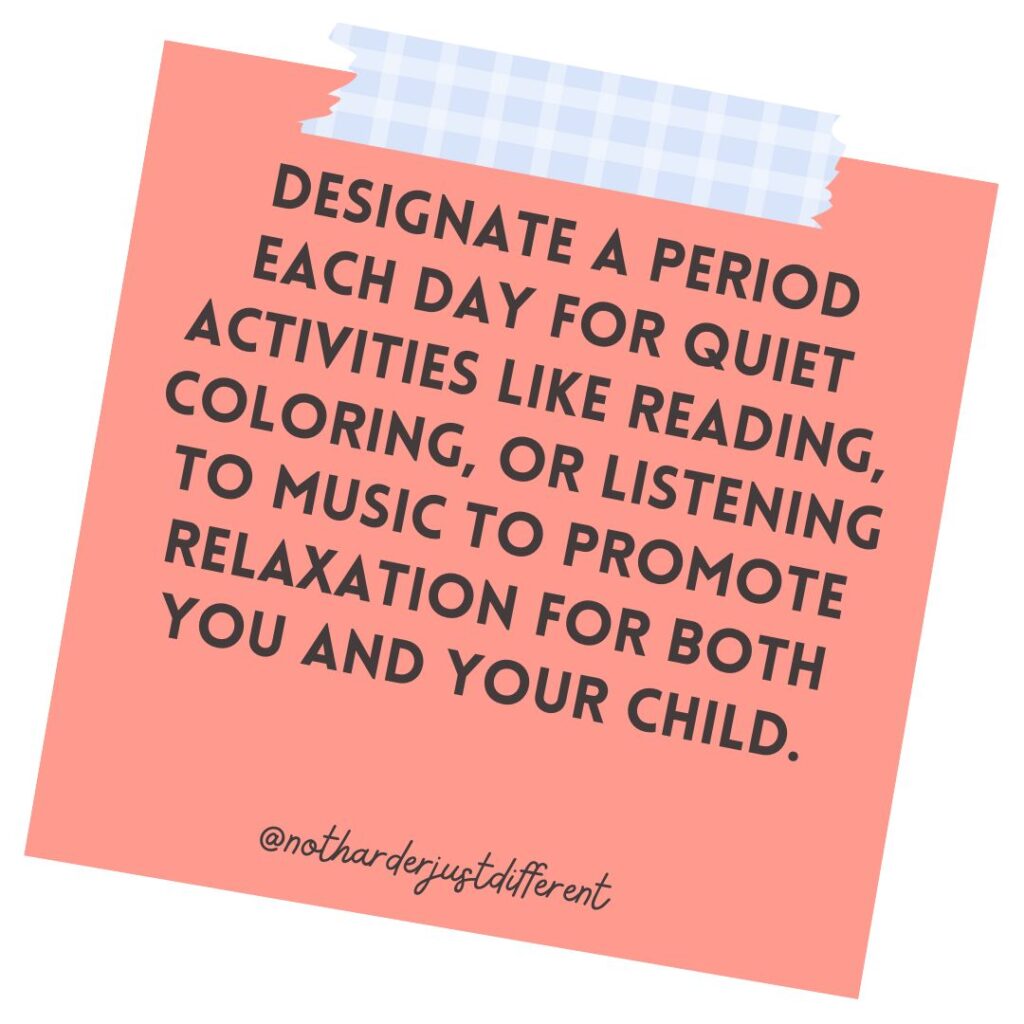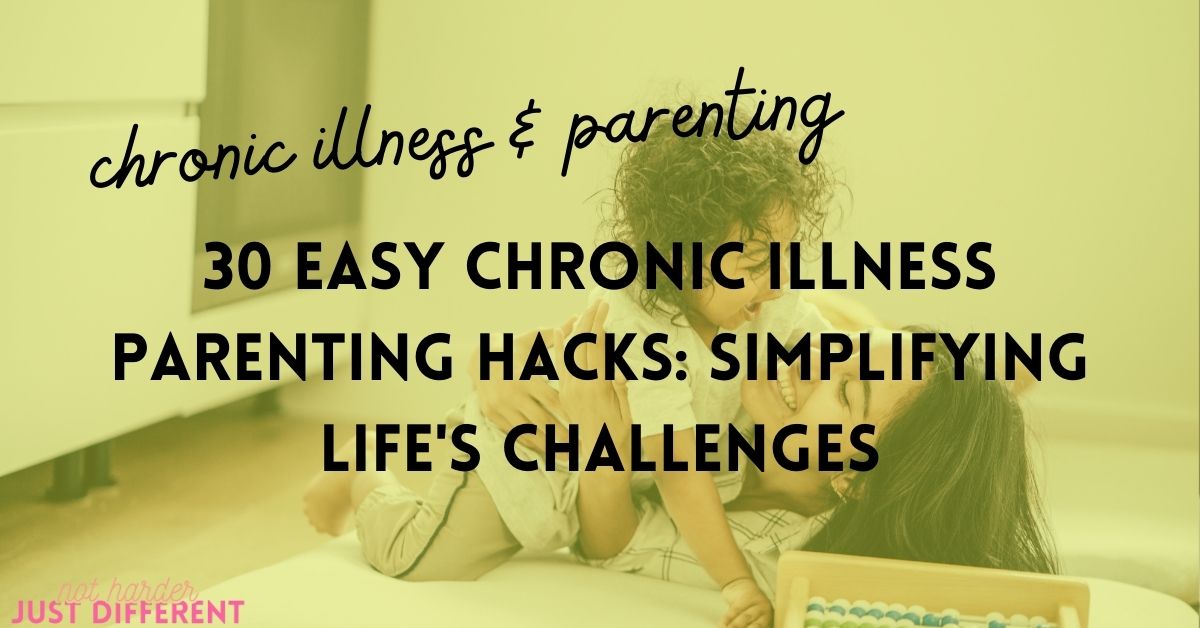Disclaimer: As a future Licensed Clinical Social Worker (LCSW) currently pursuing my master’s degree, I am passionate about sharing insights and information related to parenting, autism and homeschooling based on my personal experiences and research. However, the content shared on this blog is not intended to substitute professional advice, diagnosis, or treatment. Parenting is a deeply personal journey, and while I strive to provide valuable insights, every family and situation is unique. Readers are encouraged to consult with qualified professionals for personalized guidance tailored to their specific needs and circumstances.
Parenting while managing a chronic illness can be overwhelming, but fear not! With a few clever hacks up your sleeve, you can simplify life’s challenges and make everyday tasks more manageable. In this post, I want to share 30 practical chronic illness parenting hacks to help you navigate the ups and downs of parenting while prioritizing your health and well-being.
Parenting is a journey filled with unique joys and obstacles. It requires creativity, patience, and resilience, especially when you’re also managing the complexities of chronic illness. But remember, you’re not alone in this journey. These parenting hacks are designed to empower you and make life a little easier so you can focus on what matters most—nurturing your child and taking care of yourself.

30 Chronic Illness Parenting Hacks
Create a Daily Routine
Establishing a predictable routine can provide stability and comfort for both you and your child.
Use Visual Schedules
Visual schedules can help your child understand expectations and transitions throughout the day.
Set Up a Quiet Corner
Designate a quiet, calming space where your child can retreat when feeling overwhelmed.
Meal Prep
Preparing meals in advance can save time and energy on hectic days.
Delegate Tasks
Don’t be afraid to ask for help from family members or friends when you need it.
Invest in Adaptive Equipment
Explore adaptive equipment and tools to make daily tasks easier for both you and your child.
Practice Mindfulness
Incorporate mindfulness techniques into your daily routine to reduce stress and promote relaxation.
Stay Organized
Use calendars, planners, and digital apps to stay on top of appointments and deadlines.
Take Breaks
Remember to take breaks throughout the day to recharge and prevent burnout.
Simplify Clothing Choices
Opt for comfortable, easy-to-wear clothing for both you and your child.
Explore Online Resources
Take advantage of online communities and resources for support and advice.
Create a Weekly Meal Plan
Plan out meals for the week ahead to save time and reduce stress when it comes to mealtime decisions.
Practice Time Blocking
Allocate specific time blocks for different tasks throughout the day to maximize productivity and manage energy levels.
Utilize Online Shopping
Take advantage of online grocery shopping and delivery services to save time and energy on trips to the store.

Establish Quiet Time
Designate a period each day for quiet activities like reading, coloring, or listening to music to promote relaxation for both you and your child.
Invest in Assistive Technology
Explore assistive technology options that can help you and your child manage daily tasks more efficiently.
Create a Family Command Center
Designate a central location in your home for important documents, schedules, and reminders to keep everyone organized and on track.
Practice Deep Breathing Exercises
Incorporate deep breathing exercises into your daily routine to reduce stress and promote a sense of calm for both you and your child.
Prioritize Sleep Hygiene
Establish a consistent bedtime routine and create a sleep-friendly environment to ensure restful nights for the whole family.
Delegate Household Chores
Divide household chores among family members to lighten the load and foster a sense of teamwork and responsibility.
Celebrate Self-Care Days
Schedule regular self-care days where you and your child indulge in activities that bring joy and relaxation, whether it’s a movie marathon, a picnic in the park, or a spa day at home.
Create a Sensory-Friendly Environment
Consider the sensory needs of your child when designing their living and play spaces.
Practice Positive Reinforcement
Use praise and rewards to encourage positive behavior and milestones.
Stay Flexible
Embrace flexibility and adaptability as you navigate the unpredictable nature of parenting and chronic illness.
Schedule Regular Self-Care Time
Prioritize self-care activities that rejuvenate and replenish your energy.
Celebrate Small Wins
Acknowledge and celebrate the achievements, no matter how small, of both you and your child.
Communicate Openly
Foster open communication with your child and partner about your needs and challenges.
Create a Support Network
Surround yourself with understanding and supportive friends, family members, and healthcare professionals.
Practice Gratitude
Cultivate a mindset of gratitude to find joy and appreciation in everyday moments.
Remember to Laugh
Find humor in the ups and downs of parenting and chronic illness—it’s good for the soul!
These chronic illness parenting hacks are designed to help you navigate the challenges of parenting while managing your own health needs. By incorporating these practical tips into your daily life, you can create a supportive and nurturing environment where both you and your child can thrive. Remember, you’re doing an incredible job, and you’re not alone on this journey.

